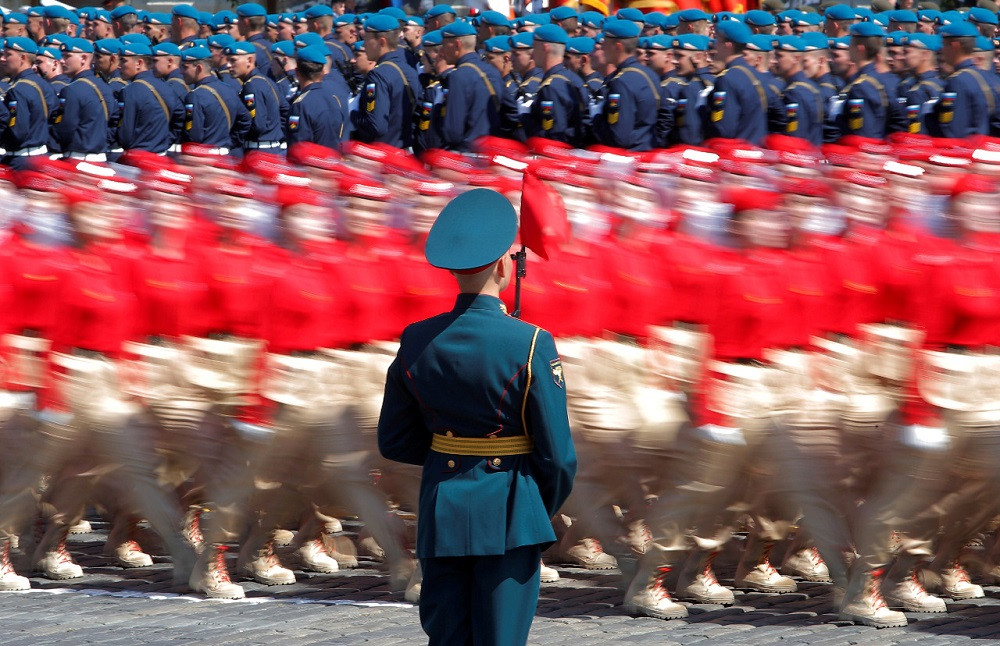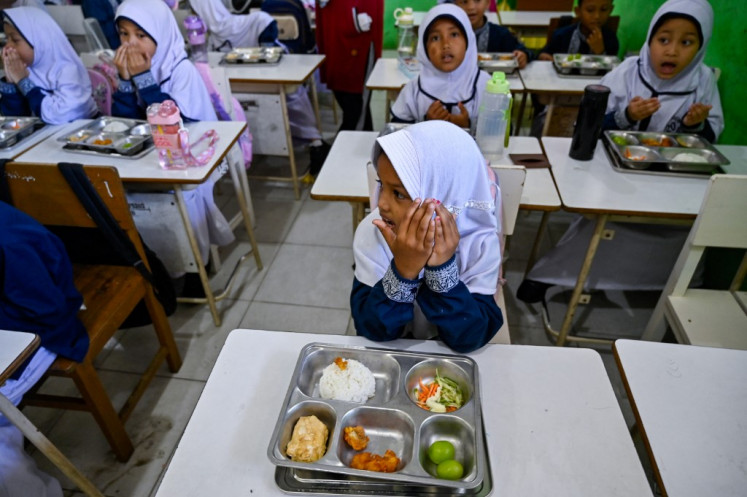Popular Reads
Top Results
Can't find what you're looking for?
View all search resultsPopular Reads
Top Results
Can't find what you're looking for?
View all search resultsShared responsibility to history and our future
The agenda proposed by Russia for the upcoming summit of the Five is extremely important and relevant both for our countries and for the entire world. And we have specific ideas and initiatives on all the items.
Change text size
Gift Premium Articles
to Anyone
 Strong spirit: Members of the Youth Army movement march during a Victory Day parade at the Red Square in Moscow on June 24. The military parade, marking the 75th anniversary of the victory over Nazi Germany in World War II, was scheduled for May 9 but postponed due to COVID-19. (Reuters/Maxim Shemetov)
Strong spirit: Members of the Youth Army movement march during a Victory Day parade at the Red Square in Moscow on June 24. The military parade, marking the 75th anniversary of the victory over Nazi Germany in World War II, was scheduled for May 9 but postponed due to COVID-19. (Reuters/Maxim Shemetov)
S
eventy-five years have passed since the end of the Great Patriotic War. On June 22, 1941, the Soviet Union faced the strongest, most mobilized and skilled army in the world with the industrial, economic and military potential of almost all Europe working for it. Not only the Wehrmacht, but also Germany’s satellites, military contingents of many other states of the European continent, took part in this deadly invasion.
The Nazi “strategists” were convinced that a huge multinational state could easily be brought to heel. But from the very first days, it was clear that the Nazi plan had failed.
The Soviet Union, no matter what anyone is trying to prove today, made the main and crucial contribution to the defeat of Nazism. By mid-1944, the enemy was expelled from virtually all of the Soviet territory. However, the enemy had to be finished off in its lair.
And so the Red Army started its liberation mission in Europe. It saved entire nations from destruction and enslavement, and from the horror of the Holocaust. They were saved at the cost of hundreds of thousands of lives of Soviet soldiers.
The efforts of all countries and peoples who fought against a common enemy resulted in victory. The British army protected its homeland from invasion, fought the Nazis and their satellites in the Mediterranean and North Africa. American and British troops liberated Italy and opened the Second Front. The US dealt powerful and crushing strikes against the aggressor in the Pacific Ocean.
The victor powers left us a system that has become the quintessence of the intellectual and political quest of several centuries. A series of conferences – Tehran, Yalta, San Francisco and Potsdam – laid the foundation of a world that for 75 years had no global war, despite the sharpest contradictions.
Historical revisionism, the manifestations of which we now observe in the West, primarily with regard to the subject of World War II and its outcome, is dangerous because it grossly and cynically distorts the understanding of the principles of peaceful development, laid down at the Yalta and San Francisco conferences in 1945. The major historic achievement of Yalta and other decisions of that time is the agreement to create a mechanism that would allow the leading powers to remain within the framework of diplomacy in resolving their differences.
The twentieth century brought large-scale and comprehensive global conflicts, and in 1945, nuclear weapons capable of physically destroying the Earth also entered the scene. In other words, the settlement of disputes by force has become prohibitively dangerous. And the victors in World War II understood that. They understood and were aware of their own responsibility toward humanity.
A new global confrontation started almost immediately after the end of World War II and was at times very fierce. And the fact that the Cold War did not grow into World War III has become a clear testimony of the effectiveness of the agreements concluded by the Big Three. The rules of conduct agreed upon during the creation of the United Nations made it possible to further minimize risks and keep confrontation under control.
Of course, we can see that the UN system currently experiences certain tension in its work and is not as effective as it could be. But the UN still performs its primary function. The principles of the UN Security Council are a unique mechanism for preventing a major war or a global conflict.
The calls that have been made quite often in recent years to abolish the power of veto, to deny special opportunities to permanent members of the Security Council, are actually irresponsible. After all, if that happens, the UN would in essence become the League of Nations – a meeting for empty talk without any leverage on the world processes. How it ended is well known. That is why the victor powers approached the formation of the new system of the world order with utmost seriousness seeking to avoid repetition of mistakes made by their predecessors.
The creation of the modern system of international relations is one of the major outcomes of World War II. It is a duty of ours – all those who take political responsibility and primarily representatives of the victor powers in World War II – to guarantee that this system is maintained and improved.
Our colleagues – Mr. Xi Jinping, Mr. Emmanuel Macron, Mr. Donald Trump and Mr. Boris Johnson – supported the Russian initiative to hold a meeting of the leaders of the five nuclear-weapon states, permanent members of the Security Council.
It would be useful to discuss steps to develop collective principles in world affairs. To speak frankly about the issues of preserving peace, strengthening global and regional security. A special item on the agenda of the meeting is the situation in the global economy. And above all, overcoming the economic crisis caused by the coronavirus pandemic.
Our ability to work together and in concert, as real partners, will show how severe the impact of the pandemic will be, and how quickly the global economy will emerge from the recession. Moreover, it is unacceptable to turn the economy into an instrument of pressure and confrontation. Popular issues include environmental protection and combating climate change, as well as ensuring the security of the global information space.
The agenda proposed by Russia for the upcoming summit of the Five is extremely important and relevant both for our countries and for the entire world. And we have specific ideas and initiatives on all the items.
There can be no doubt that the summit of Russia, China, France, the United States, and the UK will play an important role in finding common answers to modern challenges and threats, and will demonstrate a common commitment to the spirit of alliance, to those high humanist ideals and values for which our fathers and grandfathers fought shoulder to shoulder.
Drawing on a shared historical memory, we can trust each other and must do so. That will serve as a solid basis for successful negotiations and concerted action for the sake of enhancing the stability and security on the planet, for the sake of prosperity and well-being of all states.
***
The writer is President of Russia. The article is abridged from the original text which is available here.









